Macro and Micro Economic Impacts of UK Work Visa Policy
VerifiedAdded on 2022/09/09
|9
|1555
|22
Report
AI Summary
This report investigates the economic implications of the UK government's work visa policy for overseas students, focusing on both microeconomic and macroeconomic aspects. The analysis examines the impact of extending work visas on labor supply, wage rates, and employment levels. The report utilizes figures to illustrate shifts in labor supply and aggregate expenditure, exploring how the policy affects the UK's GDP growth, consumption, and investment. The microeconomic section discusses the potential decrease in wage rates due to increased labor supply, while the macroeconomic section assesses the impact on aggregate expenditure and overall economic growth, referencing the expenditure-output theory. The conclusion summarizes the findings, highlighting the trade-offs between increased employment and potential wage decline, and the policy's influence on economic output and real wages.
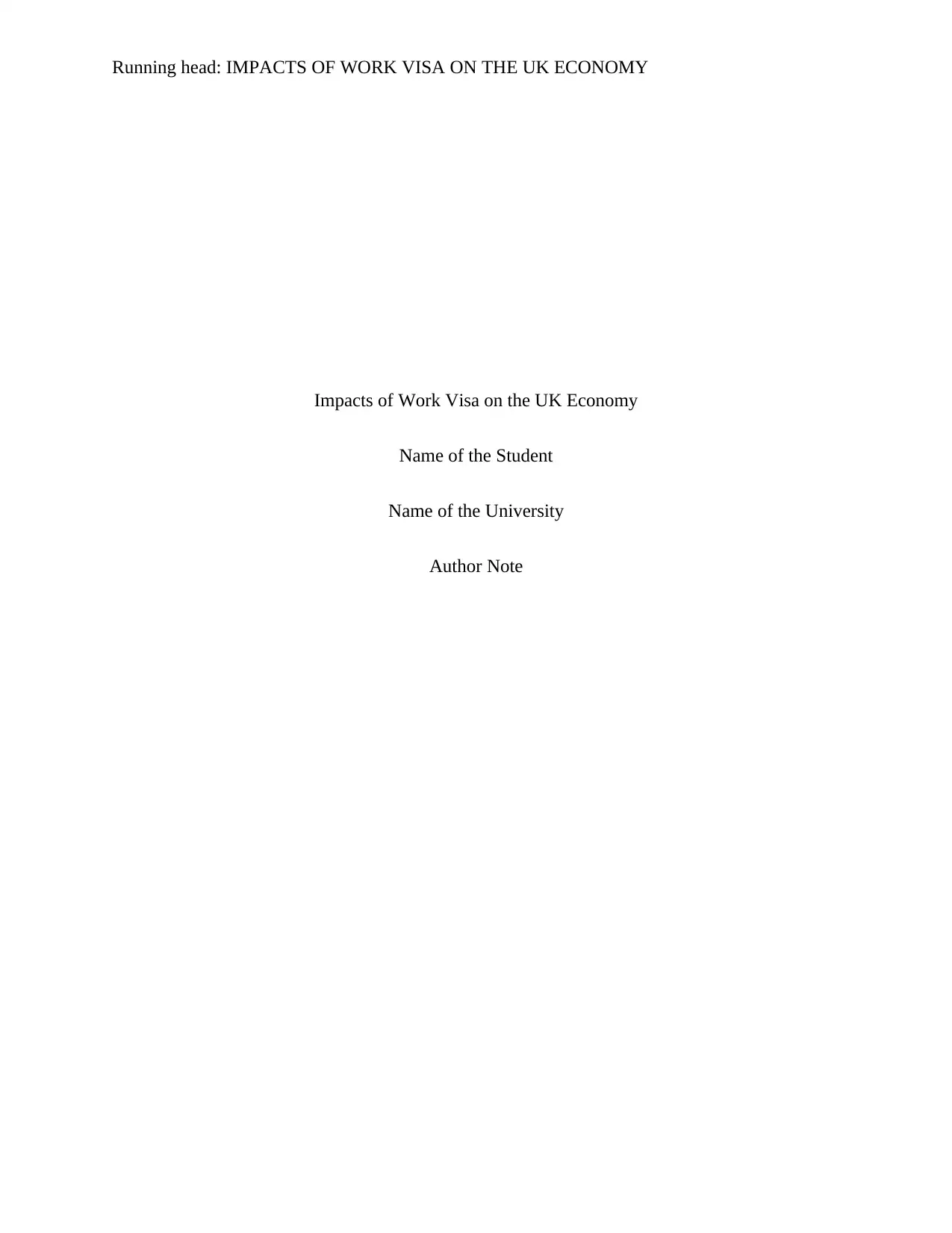
Running head: IMPACTS OF WORK VISA ON THE UK ECONOMY
Impacts of Work Visa on the UK Economy
Name of the Student
Name of the University
Author Note
Impacts of Work Visa on the UK Economy
Name of the Student
Name of the University
Author Note
Paraphrase This Document
Need a fresh take? Get an instant paraphrase of this document with our AI Paraphraser
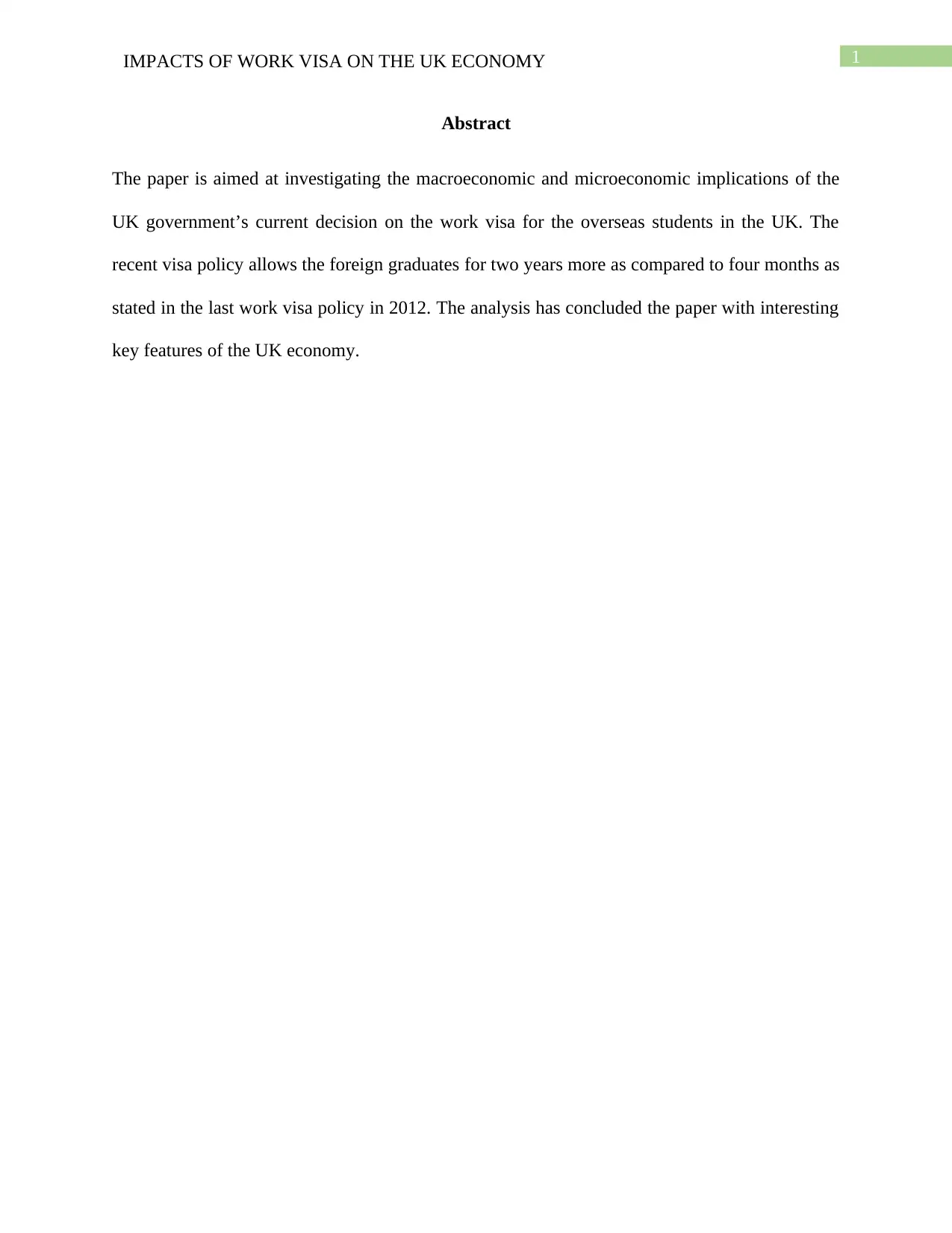
1IMPACTS OF WORK VISA ON THE UK ECONOMY
Abstract
The paper is aimed at investigating the macroeconomic and microeconomic implications of the
UK government’s current decision on the work visa for the overseas students in the UK. The
recent visa policy allows the foreign graduates for two years more as compared to four months as
stated in the last work visa policy in 2012. The analysis has concluded the paper with interesting
key features of the UK economy.
Abstract
The paper is aimed at investigating the macroeconomic and microeconomic implications of the
UK government’s current decision on the work visa for the overseas students in the UK. The
recent visa policy allows the foreign graduates for two years more as compared to four months as
stated in the last work visa policy in 2012. The analysis has concluded the paper with interesting
key features of the UK economy.
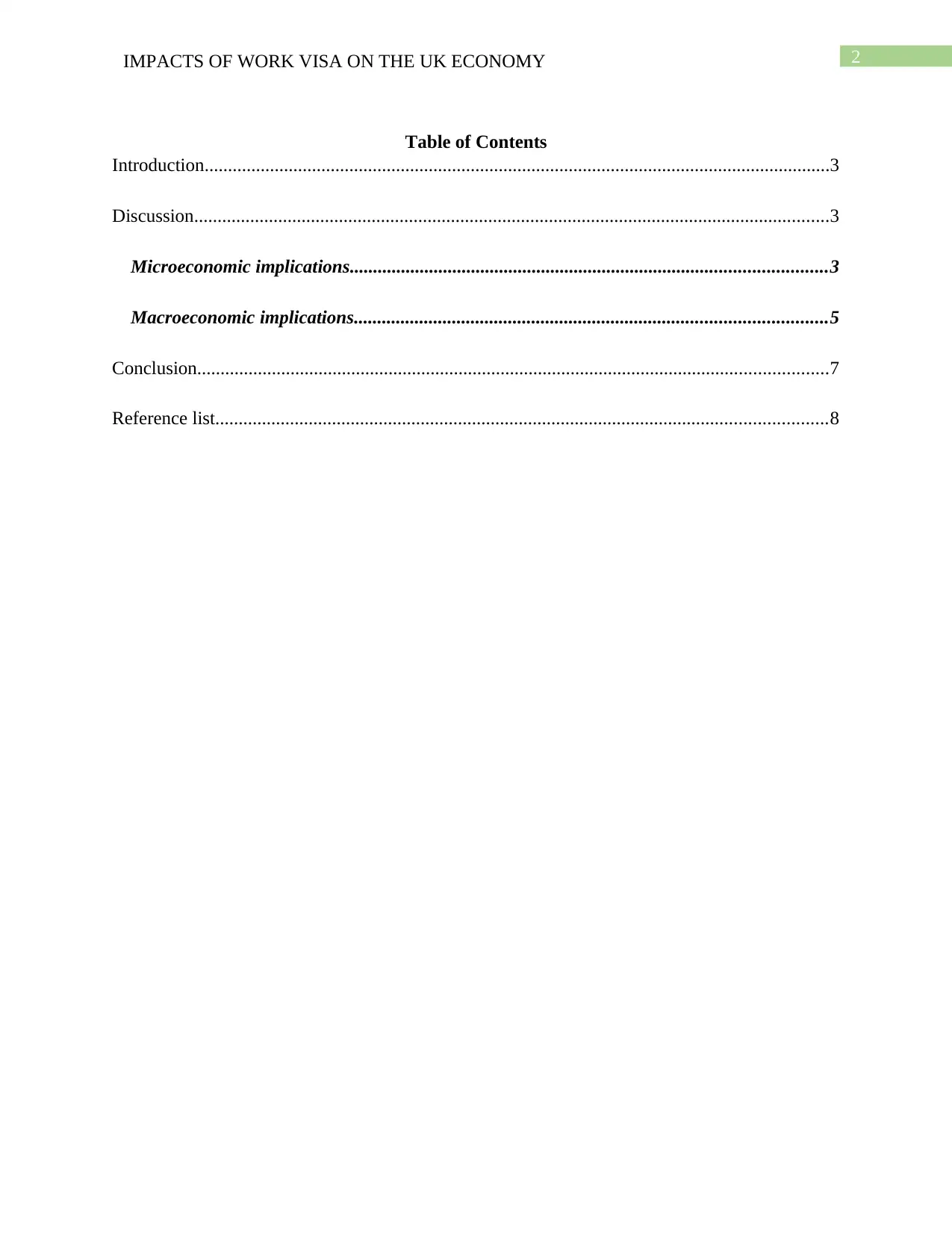
2IMPACTS OF WORK VISA ON THE UK ECONOMY
Table of Contents
Introduction......................................................................................................................................3
Discussion........................................................................................................................................3
Microeconomic implications......................................................................................................3
Macroeconomic implications.....................................................................................................5
Conclusion.......................................................................................................................................7
Reference list...................................................................................................................................8
Table of Contents
Introduction......................................................................................................................................3
Discussion........................................................................................................................................3
Microeconomic implications......................................................................................................3
Macroeconomic implications.....................................................................................................5
Conclusion.......................................................................................................................................7
Reference list...................................................................................................................................8
⊘ This is a preview!⊘
Do you want full access?
Subscribe today to unlock all pages.

Trusted by 1+ million students worldwide
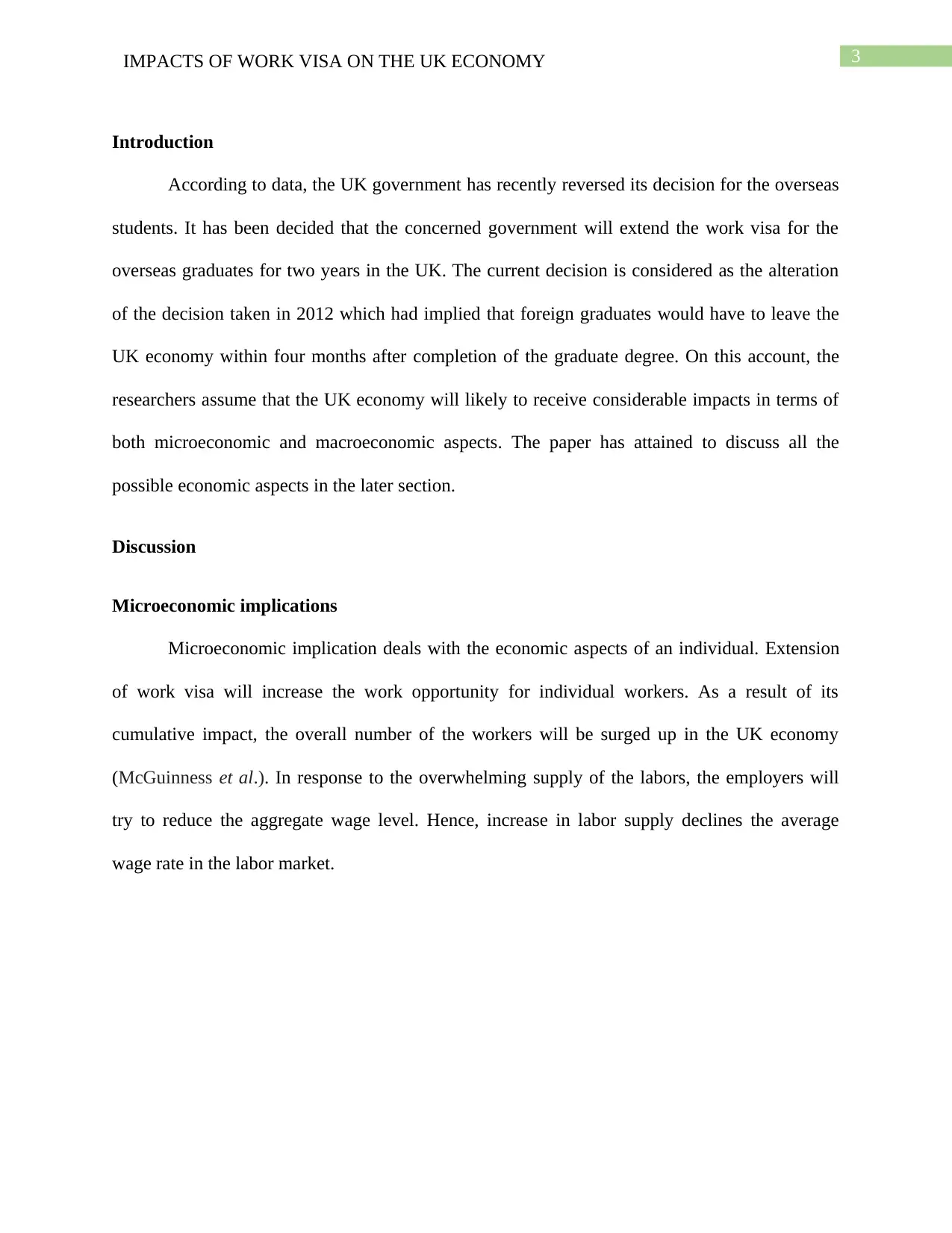
3IMPACTS OF WORK VISA ON THE UK ECONOMY
Introduction
According to data, the UK government has recently reversed its decision for the overseas
students. It has been decided that the concerned government will extend the work visa for the
overseas graduates for two years in the UK. The current decision is considered as the alteration
of the decision taken in 2012 which had implied that foreign graduates would have to leave the
UK economy within four months after completion of the graduate degree. On this account, the
researchers assume that the UK economy will likely to receive considerable impacts in terms of
both microeconomic and macroeconomic aspects. The paper has attained to discuss all the
possible economic aspects in the later section.
Discussion
Microeconomic implications
Microeconomic implication deals with the economic aspects of an individual. Extension
of work visa will increase the work opportunity for individual workers. As a result of its
cumulative impact, the overall number of the workers will be surged up in the UK economy
(McGuinness et al.). In response to the overwhelming supply of the labors, the employers will
try to reduce the aggregate wage level. Hence, increase in labor supply declines the average
wage rate in the labor market.
Introduction
According to data, the UK government has recently reversed its decision for the overseas
students. It has been decided that the concerned government will extend the work visa for the
overseas graduates for two years in the UK. The current decision is considered as the alteration
of the decision taken in 2012 which had implied that foreign graduates would have to leave the
UK economy within four months after completion of the graduate degree. On this account, the
researchers assume that the UK economy will likely to receive considerable impacts in terms of
both microeconomic and macroeconomic aspects. The paper has attained to discuss all the
possible economic aspects in the later section.
Discussion
Microeconomic implications
Microeconomic implication deals with the economic aspects of an individual. Extension
of work visa will increase the work opportunity for individual workers. As a result of its
cumulative impact, the overall number of the workers will be surged up in the UK economy
(McGuinness et al.). In response to the overwhelming supply of the labors, the employers will
try to reduce the aggregate wage level. Hence, increase in labor supply declines the average
wage rate in the labor market.
Paraphrase This Document
Need a fresh take? Get an instant paraphrase of this document with our AI Paraphraser
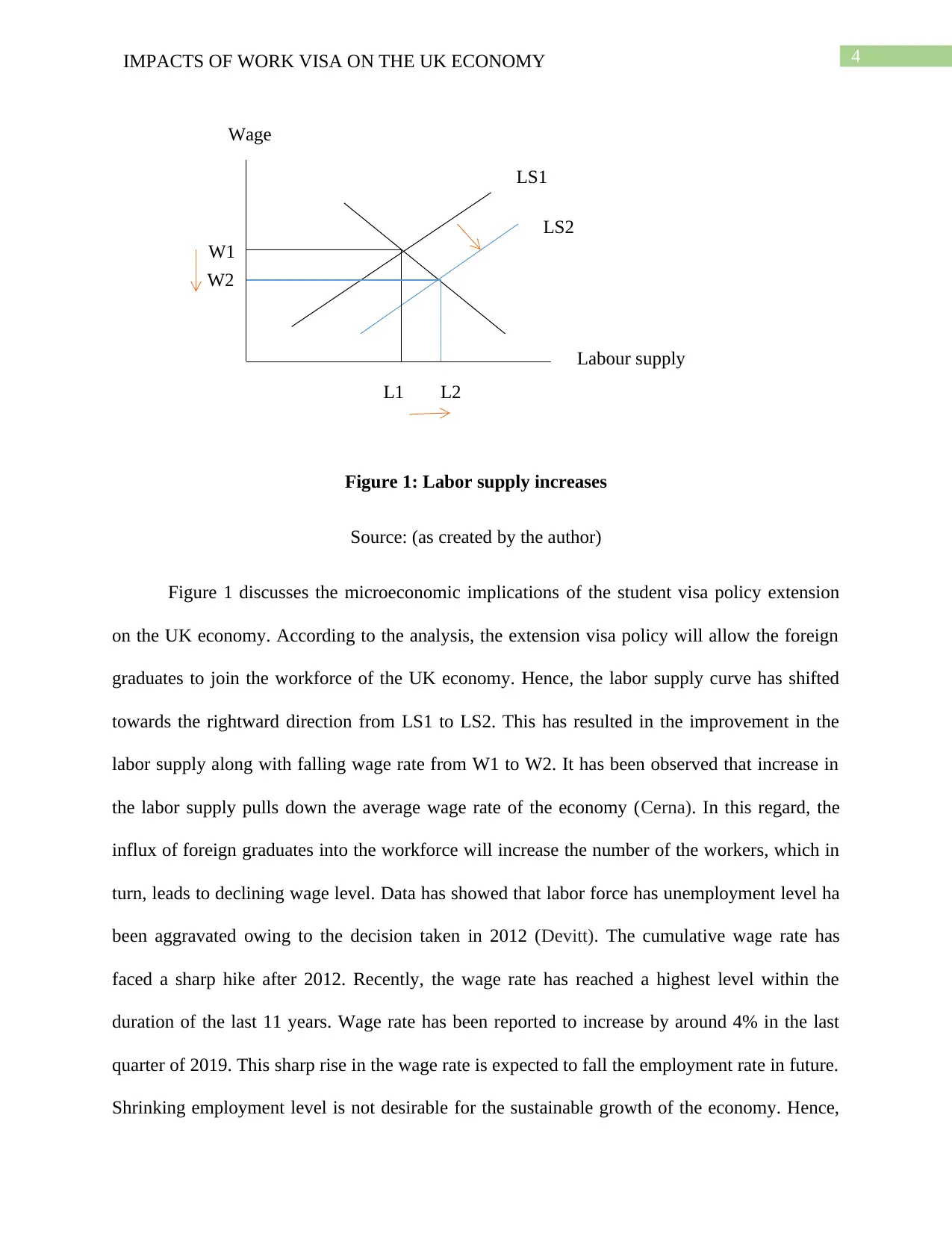
4IMPACTS OF WORK VISA ON THE UK ECONOMY
LS1
LS2
Labour supply
Wage
L1 L2
W1
W2
Figure 1: Labor supply increases
Source: (as created by the author)
Figure 1 discusses the microeconomic implications of the student visa policy extension
on the UK economy. According to the analysis, the extension visa policy will allow the foreign
graduates to join the workforce of the UK economy. Hence, the labor supply curve has shifted
towards the rightward direction from LS1 to LS2. This has resulted in the improvement in the
labor supply along with falling wage rate from W1 to W2. It has been observed that increase in
the labor supply pulls down the average wage rate of the economy (Cerna). In this regard, the
influx of foreign graduates into the workforce will increase the number of the workers, which in
turn, leads to declining wage level. Data has showed that labor force has unemployment level ha
been aggravated owing to the decision taken in 2012 (Devitt). The cumulative wage rate has
faced a sharp hike after 2012. Recently, the wage rate has reached a highest level within the
duration of the last 11 years. Wage rate has been reported to increase by around 4% in the last
quarter of 2019. This sharp rise in the wage rate is expected to fall the employment rate in future.
Shrinking employment level is not desirable for the sustainable growth of the economy. Hence,
LS1
LS2
Labour supply
Wage
L1 L2
W1
W2
Figure 1: Labor supply increases
Source: (as created by the author)
Figure 1 discusses the microeconomic implications of the student visa policy extension
on the UK economy. According to the analysis, the extension visa policy will allow the foreign
graduates to join the workforce of the UK economy. Hence, the labor supply curve has shifted
towards the rightward direction from LS1 to LS2. This has resulted in the improvement in the
labor supply along with falling wage rate from W1 to W2. It has been observed that increase in
the labor supply pulls down the average wage rate of the economy (Cerna). In this regard, the
influx of foreign graduates into the workforce will increase the number of the workers, which in
turn, leads to declining wage level. Data has showed that labor force has unemployment level ha
been aggravated owing to the decision taken in 2012 (Devitt). The cumulative wage rate has
faced a sharp hike after 2012. Recently, the wage rate has reached a highest level within the
duration of the last 11 years. Wage rate has been reported to increase by around 4% in the last
quarter of 2019. This sharp rise in the wage rate is expected to fall the employment rate in future.
Shrinking employment level is not desirable for the sustainable growth of the economy. Hence,
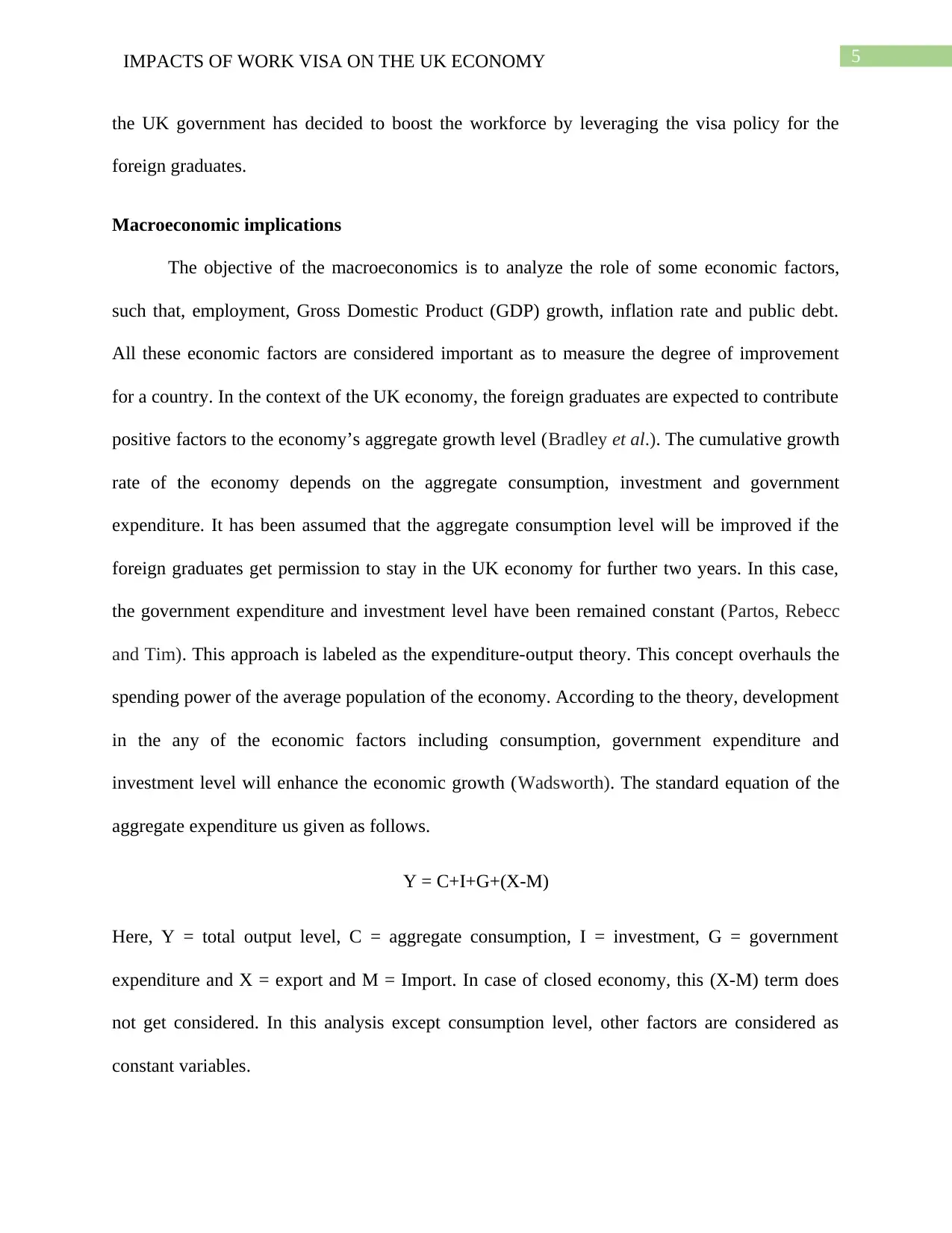
5IMPACTS OF WORK VISA ON THE UK ECONOMY
the UK government has decided to boost the workforce by leveraging the visa policy for the
foreign graduates.
Macroeconomic implications
The objective of the macroeconomics is to analyze the role of some economic factors,
such that, employment, Gross Domestic Product (GDP) growth, inflation rate and public debt.
All these economic factors are considered important as to measure the degree of improvement
for a country. In the context of the UK economy, the foreign graduates are expected to contribute
positive factors to the economy’s aggregate growth level (Bradley et al.). The cumulative growth
rate of the economy depends on the aggregate consumption, investment and government
expenditure. It has been assumed that the aggregate consumption level will be improved if the
foreign graduates get permission to stay in the UK economy for further two years. In this case,
the government expenditure and investment level have been remained constant (Partos, Rebecc
and Tim). This approach is labeled as the expenditure-output theory. This concept overhauls the
spending power of the average population of the economy. According to the theory, development
in the any of the economic factors including consumption, government expenditure and
investment level will enhance the economic growth (Wadsworth). The standard equation of the
aggregate expenditure us given as follows.
Y = C+I+G+(X-M)
Here, Y = total output level, C = aggregate consumption, I = investment, G = government
expenditure and X = export and M = Import. In case of closed economy, this (X-M) term does
not get considered. In this analysis except consumption level, other factors are considered as
constant variables.
the UK government has decided to boost the workforce by leveraging the visa policy for the
foreign graduates.
Macroeconomic implications
The objective of the macroeconomics is to analyze the role of some economic factors,
such that, employment, Gross Domestic Product (GDP) growth, inflation rate and public debt.
All these economic factors are considered important as to measure the degree of improvement
for a country. In the context of the UK economy, the foreign graduates are expected to contribute
positive factors to the economy’s aggregate growth level (Bradley et al.). The cumulative growth
rate of the economy depends on the aggregate consumption, investment and government
expenditure. It has been assumed that the aggregate consumption level will be improved if the
foreign graduates get permission to stay in the UK economy for further two years. In this case,
the government expenditure and investment level have been remained constant (Partos, Rebecc
and Tim). This approach is labeled as the expenditure-output theory. This concept overhauls the
spending power of the average population of the economy. According to the theory, development
in the any of the economic factors including consumption, government expenditure and
investment level will enhance the economic growth (Wadsworth). The standard equation of the
aggregate expenditure us given as follows.
Y = C+I+G+(X-M)
Here, Y = total output level, C = aggregate consumption, I = investment, G = government
expenditure and X = export and M = Import. In case of closed economy, this (X-M) term does
not get considered. In this analysis except consumption level, other factors are considered as
constant variables.
⊘ This is a preview!⊘
Do you want full access?
Subscribe today to unlock all pages.

Trusted by 1+ million students worldwide
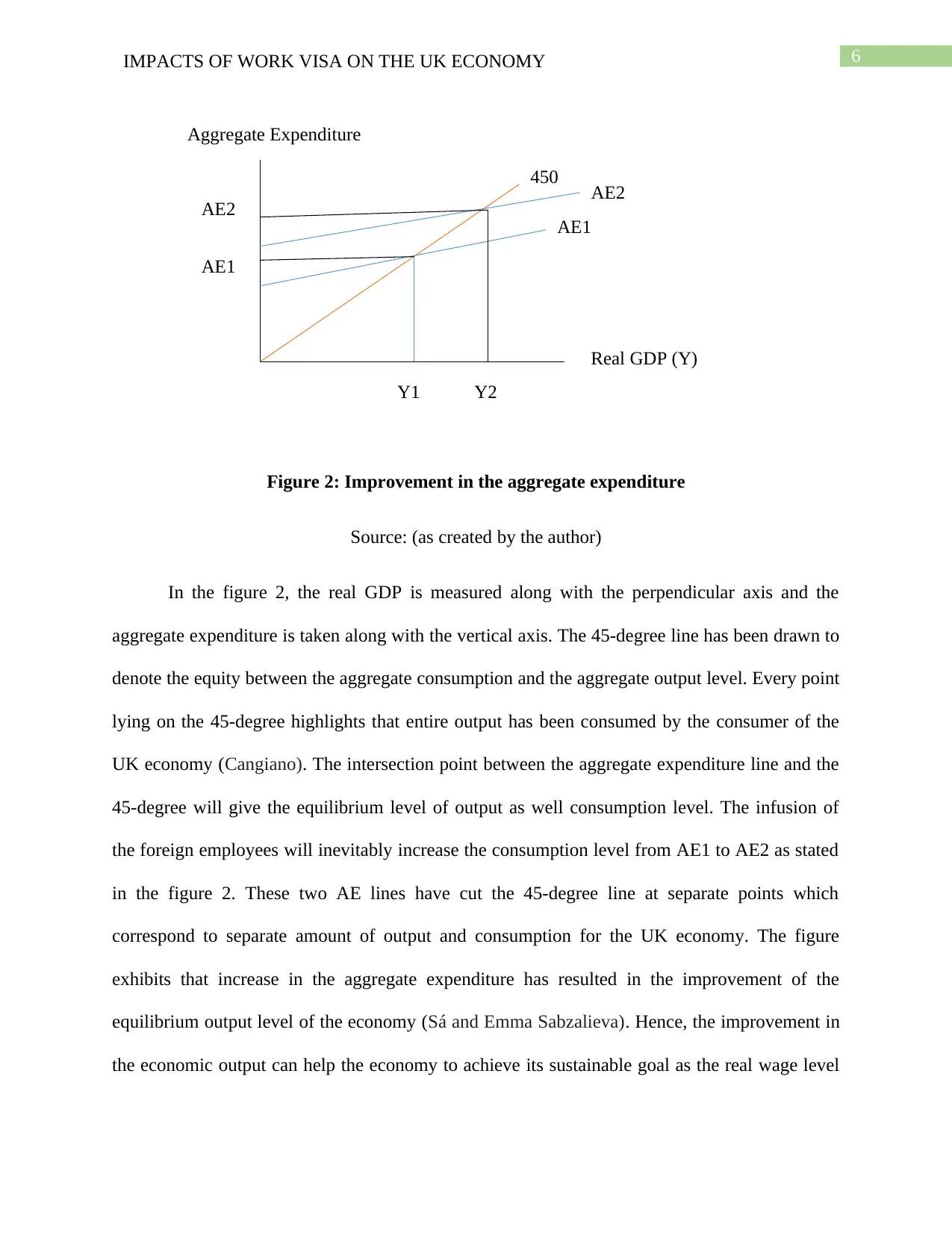
6IMPACTS OF WORK VISA ON THE UK ECONOMY
450
AE1
Real GDP (Y)
Aggregate Expenditure
Y1 Y2
AE2
AE2
AE1
Figure 2: Improvement in the aggregate expenditure
Source: (as created by the author)
In the figure 2, the real GDP is measured along with the perpendicular axis and the
aggregate expenditure is taken along with the vertical axis. The 45-degree line has been drawn to
denote the equity between the aggregate consumption and the aggregate output level. Every point
lying on the 45-degree highlights that entire output has been consumed by the consumer of the
UK economy (Cangiano). The intersection point between the aggregate expenditure line and the
45-degree will give the equilibrium level of output as well consumption level. The infusion of
the foreign employees will inevitably increase the consumption level from AE1 to AE2 as stated
in the figure 2. These two AE lines have cut the 45-degree line at separate points which
correspond to separate amount of output and consumption for the UK economy. The figure
exhibits that increase in the aggregate expenditure has resulted in the improvement of the
equilibrium output level of the economy (Sá and Emma Sabzalieva). Hence, the improvement in
the economic output can help the economy to achieve its sustainable goal as the real wage level
450
AE1
Real GDP (Y)
Aggregate Expenditure
Y1 Y2
AE2
AE2
AE1
Figure 2: Improvement in the aggregate expenditure
Source: (as created by the author)
In the figure 2, the real GDP is measured along with the perpendicular axis and the
aggregate expenditure is taken along with the vertical axis. The 45-degree line has been drawn to
denote the equity between the aggregate consumption and the aggregate output level. Every point
lying on the 45-degree highlights that entire output has been consumed by the consumer of the
UK economy (Cangiano). The intersection point between the aggregate expenditure line and the
45-degree will give the equilibrium level of output as well consumption level. The infusion of
the foreign employees will inevitably increase the consumption level from AE1 to AE2 as stated
in the figure 2. These two AE lines have cut the 45-degree line at separate points which
correspond to separate amount of output and consumption for the UK economy. The figure
exhibits that increase in the aggregate expenditure has resulted in the improvement of the
equilibrium output level of the economy (Sá and Emma Sabzalieva). Hence, the improvement in
the economic output can help the economy to achieve its sustainable goal as the real wage level
Paraphrase This Document
Need a fresh take? Get an instant paraphrase of this document with our AI Paraphraser
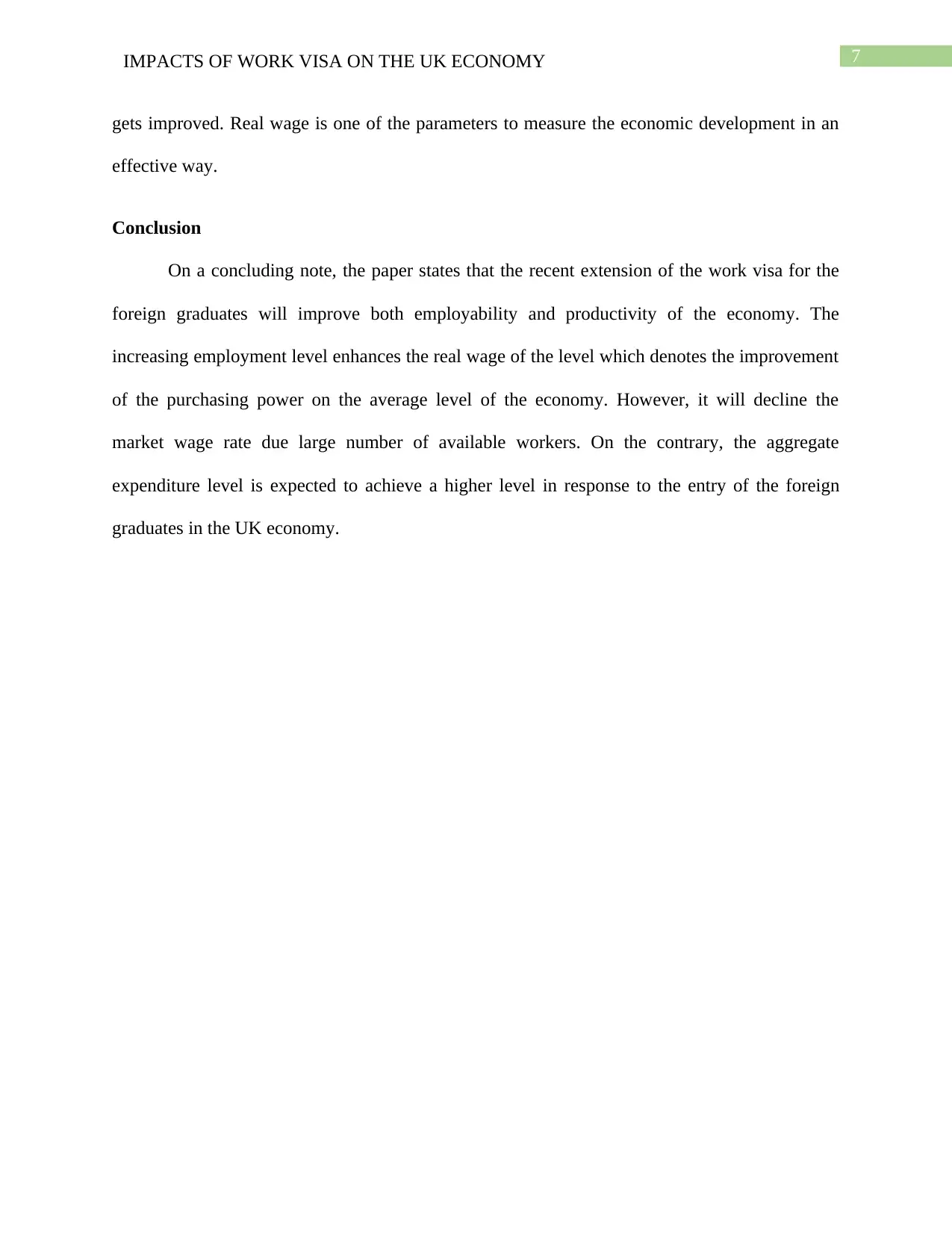
7IMPACTS OF WORK VISA ON THE UK ECONOMY
gets improved. Real wage is one of the parameters to measure the economic development in an
effective way.
Conclusion
On a concluding note, the paper states that the recent extension of the work visa for the
foreign graduates will improve both employability and productivity of the economy. The
increasing employment level enhances the real wage of the level which denotes the improvement
of the purchasing power on the average level of the economy. However, it will decline the
market wage rate due large number of available workers. On the contrary, the aggregate
expenditure level is expected to achieve a higher level in response to the entry of the foreign
graduates in the UK economy.
gets improved. Real wage is one of the parameters to measure the economic development in an
effective way.
Conclusion
On a concluding note, the paper states that the recent extension of the work visa for the
foreign graduates will improve both employability and productivity of the economy. The
increasing employment level enhances the real wage of the level which denotes the improvement
of the purchasing power on the average level of the economy. However, it will decline the
market wage rate due large number of available workers. On the contrary, the aggregate
expenditure level is expected to achieve a higher level in response to the entry of the foreign
graduates in the UK economy.
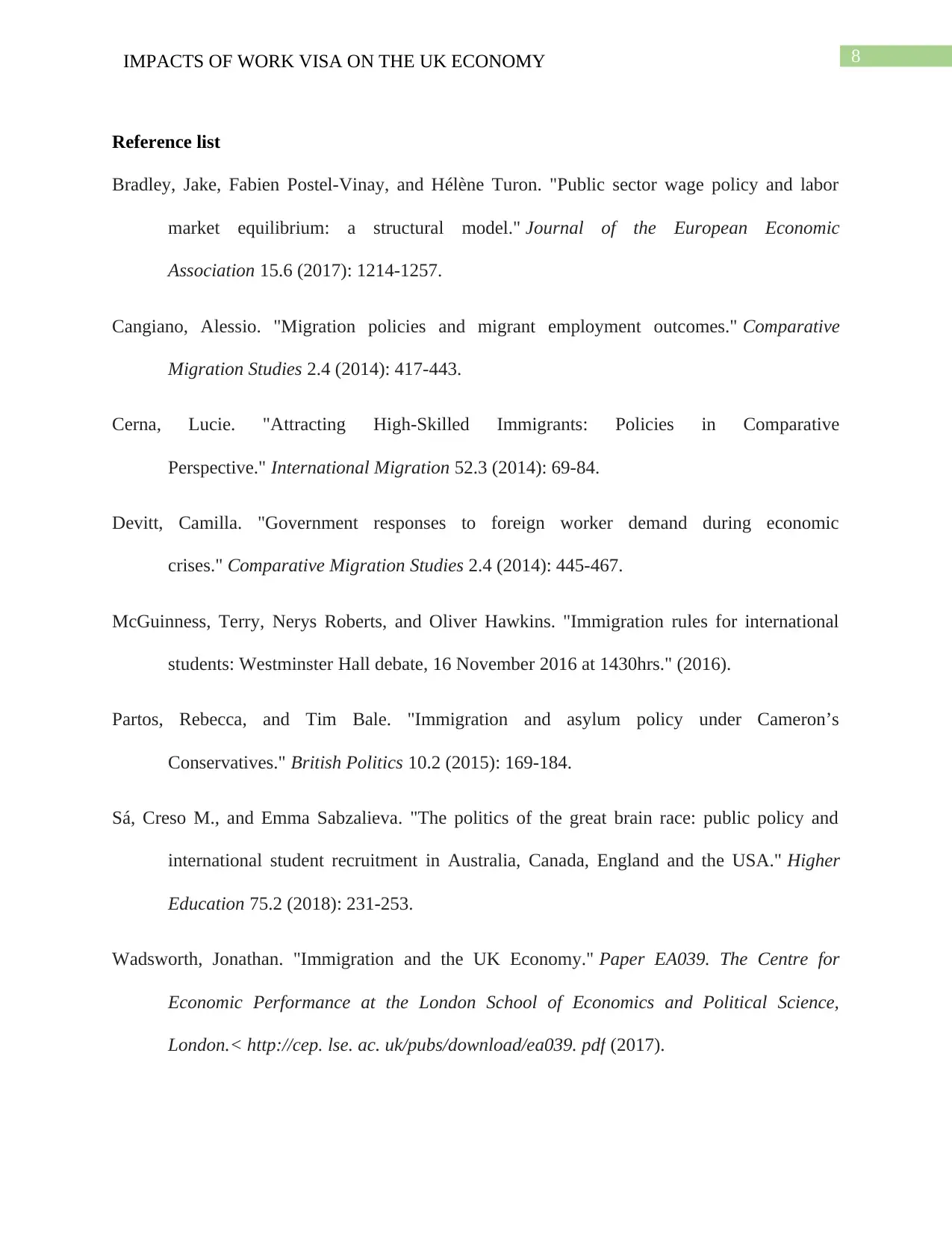
8IMPACTS OF WORK VISA ON THE UK ECONOMY
Reference list
Bradley, Jake, Fabien Postel-Vinay, and Hélène Turon. "Public sector wage policy and labor
market equilibrium: a structural model." Journal of the European Economic
Association 15.6 (2017): 1214-1257.
Cangiano, Alessio. "Migration policies and migrant employment outcomes." Comparative
Migration Studies 2.4 (2014): 417-443.
Cerna, Lucie. "Attracting High‐Skilled Immigrants: Policies in Comparative
Perspective." International Migration 52.3 (2014): 69-84.
Devitt, Camilla. "Government responses to foreign worker demand during economic
crises." Comparative Migration Studies 2.4 (2014): 445-467.
McGuinness, Terry, Nerys Roberts, and Oliver Hawkins. "Immigration rules for international
students: Westminster Hall debate, 16 November 2016 at 1430hrs." (2016).
Partos, Rebecca, and Tim Bale. "Immigration and asylum policy under Cameron’s
Conservatives." British Politics 10.2 (2015): 169-184.
Sá, Creso M., and Emma Sabzalieva. "The politics of the great brain race: public policy and
international student recruitment in Australia, Canada, England and the USA." Higher
Education 75.2 (2018): 231-253.
Wadsworth, Jonathan. "Immigration and the UK Economy." Paper EA039. The Centre for
Economic Performance at the London School of Economics and Political Science,
London.< http://cep. lse. ac. uk/pubs/download/ea039. pdf (2017).
Reference list
Bradley, Jake, Fabien Postel-Vinay, and Hélène Turon. "Public sector wage policy and labor
market equilibrium: a structural model." Journal of the European Economic
Association 15.6 (2017): 1214-1257.
Cangiano, Alessio. "Migration policies and migrant employment outcomes." Comparative
Migration Studies 2.4 (2014): 417-443.
Cerna, Lucie. "Attracting High‐Skilled Immigrants: Policies in Comparative
Perspective." International Migration 52.3 (2014): 69-84.
Devitt, Camilla. "Government responses to foreign worker demand during economic
crises." Comparative Migration Studies 2.4 (2014): 445-467.
McGuinness, Terry, Nerys Roberts, and Oliver Hawkins. "Immigration rules for international
students: Westminster Hall debate, 16 November 2016 at 1430hrs." (2016).
Partos, Rebecca, and Tim Bale. "Immigration and asylum policy under Cameron’s
Conservatives." British Politics 10.2 (2015): 169-184.
Sá, Creso M., and Emma Sabzalieva. "The politics of the great brain race: public policy and
international student recruitment in Australia, Canada, England and the USA." Higher
Education 75.2 (2018): 231-253.
Wadsworth, Jonathan. "Immigration and the UK Economy." Paper EA039. The Centre for
Economic Performance at the London School of Economics and Political Science,
London.< http://cep. lse. ac. uk/pubs/download/ea039. pdf (2017).
⊘ This is a preview!⊘
Do you want full access?
Subscribe today to unlock all pages.

Trusted by 1+ million students worldwide
1 out of 9
Related Documents
Your All-in-One AI-Powered Toolkit for Academic Success.
+13062052269
info@desklib.com
Available 24*7 on WhatsApp / Email
![[object Object]](/_next/static/media/star-bottom.7253800d.svg)
Unlock your academic potential
Copyright © 2020–2026 A2Z Services. All Rights Reserved. Developed and managed by ZUCOL.


